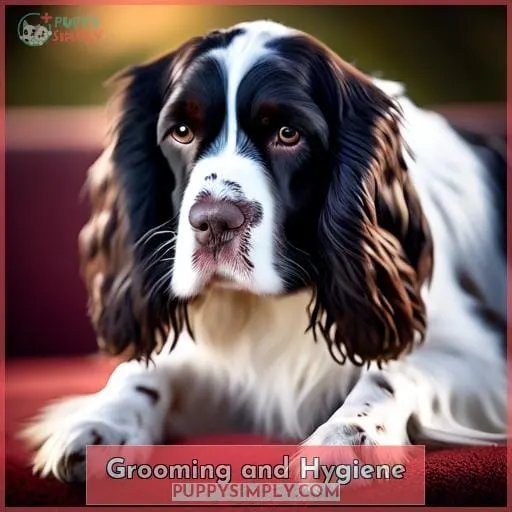This site is supported by our readers. We may earn a commission, at no cost to you, if you purchase through links.

Don’t fret; with the right approach, you can tackle the stink and keep your spaniel smelling fresh. Let’s dive into the causes and sniff out some solutions for your springer spaniel’s odor.
Yes, your Springer Spaniel might smell bad due to health issues like skin infections, ear infections, or dental problems, which are common causes of odor in dogs. Regular grooming and veterinary check-ups can help address these underlying issues.
Table Of Contents
- Key Takeaways
- Causes of Odor
- Grooming and Hygiene
- Dirt Attraction Management
- Medical Interventions
- Preventive Measures
- Frequently Asked Questions (FAQs)
- Can a Springer Spaniel’s sense of smell be affected by the same factors that cause them to have a bad odor?
- Are there any specific dietary changes that can improve the smell of a Springer Spaniel’s coat or breath?
- How does the frequency of a Springer Spaniel’s swimming or water exposure relate to their potential for developing a bad odor?
- Could a Springer Spaniel’s unique behavior or habits contribute to their smell beyond the typical causes like diet and health issues?
- Are there any breed-specific genetic factors in Springer Spaniels that predispose them to having a stronger odor compared to other dog breeds?
- Conclusion
Key Takeaways
- Chronic ear infections, skin issues, and poor dental health are common health problems that can cause English Springer Spaniels to have a stronger odor; addressing these with veterinary care is crucial.
- Regular grooming, including brushing, ear cleaning, and bathing, is essential to prevent the buildup of dirt, oils, and bacteria that can lead to a smelly dog.
- Feeding a high-quality diet that is rich in nutrients and appropriate for any food sensitivities or allergies the dog may have can help minimize potential odor.
- Preventive measures such as regular vet check-ups, proper diet, and environmental control, including air purification and humidity control, can help maintain a healthy and odor-free Springer Spaniel.
Causes of Odor
If you’ve noticed your Springer Spaniel smelling worse than usual, it’s important to understand that this isn’t just a part of being a dog.
Chronic ear infections, skin issues, and allergies can all contribute to unpleasant odors.
By addressing these health concerns and improving grooming and dietary habits, you can help your furry friend smell fresh again.
Chronic Ear Infections
Your Springer Spaniel’s chronic ear infections are a primary cause of unpleasant odors and require diligent attention to prevent and manage.
- Immune Support: Enhancing your dog’s immune system can reduce the frequency of ear problems.
- Probiotic Benefits: Incorporating probiotics into their diet may help balance ear and anal gland health.
- E-Collar Use: Preventing them from scratching can protect against infections and smelly dog issues.
Skin Infections
You’ll find that skin infections are a significant reason behind the unpleasant odors your Springer Spaniel might be emitting. These infections can disrupt your dog’s skin health, leading to a smelly coat of hair.
Effective management involves a combination of proper diet, regular bathing, and diligent dog grooming.
| Cause | Solution | Benefit |
|---|---|---|
| Fungal Infections | Topical Treatments | Improves Skin Health |
| Poor Diet | Adjusted Diet | Reduces Skin Problems |
| Infrequent Bathing | Regular Dog Grooming | Enhances Coat of Hair |
| Bacterial Growth | Antibiotic Therapies | Dermatological Diagnoses |
Allergies and Sensitivities
Addressing allergies and sensitivities is crucial in understanding why your Springer Spaniel might have a persistent bad odor. Allergies can lead to chronic ear infections and skin issues, which are common sources of unpleasant smells.
Regular preventive vet visits can help identify and manage these conditions. Implementing hypoallergenic diets and proper ear care can significantly reduce symptoms.
Sensitivity management, including allergy testing, is essential for pinpointing specific triggers like food allergies or environmental factors. By addressing these underlying issues, you can help keep your Springer Spaniel smelling fresh and feeling healthy.
Poor Grooming and Hygiene
Beyond addressing allergies and sensitivities, another significant factor contributing to odor in Springer Spaniels is poor grooming and hygiene; without regular care, your dog’s natural odors can intensify.
- Grooming Techniques: Brushing removes debris and spreads natural oils, reducing doggie odor.
- Ear Care: Regular ear cleaning prevents infections that cause a bad smell.
- Dental Health: Dental hygiene habits combat bad breath.
- Skin Maintenance: Gentle shampoo during dog bathing keeps skin healthy.
Dietary Factors
Moving on from the importance of hygiene, let’s delve into how your Springer Spaniel’s diet can be a key factor in their odor issues.
A poor diet can lead to dietary allergies and food sensitivities, affecting their skin and contributing to that dog smell.
Feeding them a nutrient-dense, balanced diet with neutralizing foods can promote healthy skin and minimize odor.
Grooming and Hygiene
If your Springer Spaniel is giving off a strong odor, it’s crucial to establish a regular grooming routine.
Ensuring your furry friend gets frequent baths, has their ears cleaned regularly, and receives proper dental care can significantly reduce unpleasant smells.
These simple steps are key to solving odor issues and keeping your Spaniel happy and healthy.
Bathing Schedule
Why should you consider a regular bathing schedule as part of your Springer Spaniel’s grooming and hygiene routine?
- Bathing Tips: Use mild dog shampoo to prevent skin irritation.
- Shampoo Selection: Choose hypoallergenic formulas to combat springer spaniel smell.
- Ear Care: Regular cleaning reduces the risk of ear infections.
- Dental Health: Integrates teeth cleaning into the grooming routine.
- Grooming Routine: Maintains overall dog health and mitigates bacterial infections.
Ear Cleaning
For optimal ear health in Springer Spaniels, it’s essential to incorporate ear cleaning into your grooming routine at least once a week.
Utilize gentle cleaning techniques to prevent common mistakes that can lead to infections.
Seek product recommendations from your vet to address scaly brownish-yellow patches indicative of yeast issues.
Dental Care
Regarding dental care as part of grooming and hygiene for Springer Spaniels, it’s crucial to acknowledge that maintaining your dog’s dental health isn’t just about fresh breath but also about preventing more serious health issues.
Given the breed’s susceptibility to dental problems, incorporating dental care into your Springer Spaniel’s routine is essential.
Considering the importance of dental health in preventing potential health issues, you’ll want to include regular teeth cleaning in your Springer Spaniel’s grooming routine.
Dirt Attraction Management
Why Springer Spaniels Smell Bad: Causes & Solutions
If you’ve noticed your Springer Spaniel has a bit of a stink, you’re not alone. Proper grooming is key to managing your furry friend’s natural inclination to get dirty and smelly. Choosing the right shampoo can make a world of difference in keeping your Spaniel fresh between baths.
Frequent Grooming
Maintaining your Springer Spaniel’s coat through regular brushing and bathing is crucial.
Transitioning to the topic of frequent grooming, especially for those that love to romp in the dirt, it’s important you’re aware that this breed’s adventurous spirit often leads to more frequent baths and grooming sessions.
Adopting effective grooming techniques ensures coat maintenance, ear health, and overall skin care, fostering optimal hygiene habits.
Choosing the Right Shampoo
After discussing the importance of frequent grooming for Springer Spaniels, it’s crucial you also pick a shampoo that’s gentle yet effective at combating dirt without stripping their coat of natural oils.
When selecting a shampoo, be mindful of the ingredients. Opt for natural, plant-based options like oatmeal or aloe vera, which soothe and moisturize sensitive skin.
Avoid products with harsh chemicals, artificial fragrances, or dyes, as these can trigger allergic reactions. Fragrance considerations are vital; choose shampoos with natural scents from essential oils to ensure your dog’s comfort and well-being.
Medical Interventions
If your Springer Spaniel is emitting a bad odor, it’s crucial to understand that this might be more than just a simple case of needing a bath.
Medical interventions can play a significant role in addressing the root causes of these smells.
Consulting with a veterinarian can help identify any underlying health issues, such as allergies or infections, and prescribe the appropriate medications or treatments to manage your dog’s condition effectively.
Veterinary Diagnosis
Despite your best efforts to manage your Springer Spaniel’s attraction to dirt, persistent odors may indicate underlying health issues that require a veterinary diagnosis.
A visit to the vet can unveil the root cause through diagnostic methods like allergy testing.
Treatment approaches vary, but your vet might suggest serum therapy options among others, ensuring your furry friend’s health and happiness.
Prescribed Medications
When your Springer Spaniel’s odor is linked to medical issues, your vet may prescribe medications such as antifungals or antibiotics to tackle underlying infections.
They’re designed to restore skin health, ensuring your furry friend feels better. Trust in veterinary dermatology; medication effectiveness can significantly improve your dog’s comfort and control unpleasant smells.
Allergy Management
Before starting any allergy management interventions for your Springer Spaniel, it’s essential to identify the specific allergens causing discomfort through veterinary testing and consultation.
- Antigen identification helps pinpoint exact triggers.
- Immunotherapy options tailor treatments, offering long-term relief.
- Flea control products prevent common allergen exposure.
- Omega-3 benefits include inflammatory reduction, promoting healthier skin and coat.
Preventive Measures
Understanding why your Springer Spaniel smells bad is the first step towards finding a solution.
Regular vet check-ups, a proper diet, and controlling the environment can significantly reduce or eliminate odors.
These measures show your commitment to your dog’s health and comfort.
Regular Vet Check-ups
Regular veterinary check-ups are a cornerstone of preventive care, ensuring your Springer Spaniel’s health issues are identified and managed early. These visits allow for tailored advice on exercise needs, climate tolerance, and odor management.
They’re crucial for socialization importance and health screening, offering you peace of mind and control over your furry friend’s well-being.
Proper Diet
Transitioning from the importance of regular vet check-ups, another crucial preventive measure for maintaining your Springer Spaniel’s health and mitigating bad odor is ensuring they’re on a proper diet.
You’ll find that a well-balanced, nutritious diet not only supports their overall health but can significantly reduce unpleasant smells emanating from your furry friend.
Hydration benefits their system, while proteins build healthy tissues.
Omega fatty acids contribute to a lustrous coat, and a raw diet may enhance digestive health.
Environmental Control
In light of the importance of environmental factors in managing your Springer Spaniel’s odor, you’ll find that with careful attention to their surroundings, you can significantly reduce unpleasant smells.
Air purification systems capture dander and allergens, while humidity control prevents mold growth.
Indoor plants naturally purify air, and aroma diffusers or scented candles add a pleasant scent, enhancing your home’s ambiance and your pet’s well-being.
Frequently Asked Questions (FAQs)
Can a Springer Spaniel’s sense of smell be affected by the same factors that cause them to have a bad odor?
Yes, factors causing bad odor in Springer Spaniels, like ear infections or allergies, can potentially affect their sense of smell.
Ear infections or allergies can lead to inflammation, which may impact the dog’s olfactory function. Inflammation, alterations in blood flow and hydration, and systemic diseases can alter olfaction and potentially affect the working efficiency of detection dogs.
Regular veterinary check-ups and proper medical care can help identify and address any underlying health issues that may be contributing to a dog’s smell.
It is important to maintain proper grooming and care for Springer Spaniels to minimize potential odors. This includes regular ear cleaning to prevent odor-causing bacteria from building up. Additionally, a high-quality diet and regular exercise can support overall health and potentially reduce issues related to bad odor.
In conclusion, while Springer Spaniels are generally known for their lack of odor, it is crucial to address any health issues, such as ear infections or allergies, that could affect their sense of smell and overall well-being.
Are there any specific dietary changes that can improve the smell of a Springer Spaniel’s coat or breath?
To improve your Springer Spaniel’s coat and breath smell, consider a balanced diet with high-quality protein, essential fatty acids, and raw fruits or vegetables for dental health.
A balanced diet is essential for maintaining a healthy coat and fresh breath in your Springer Spaniel. High-quality protein sources are crucial for a shiny and strong coat. Essential fatty acids, such as omega-3 and omega-6, are also important for coat health.
For dental health and fresher breath, incorporating raw fruits and vegetables can be beneficial.
How does the frequency of a Springer Spaniel’s swimming or water exposure relate to their potential for developing a bad odor?
Frequent swimming or water exposure can lead to a bad odor in Springer Spaniels. This is because trapped moisture creates an environment for bacterial and yeast overgrowth.
Regular drying and ear care after water activities can help prevent this issue.
Could a Springer Spaniel’s unique behavior or habits contribute to their smell beyond the typical causes like diet and health issues?
Yes, a Springer Spaniel’s unique behaviors, like their love for rolling in smelly substances and their adventurous spirit, can indeed contribute to their odor.
These activities can trap dirt and bacteria in their coat and ears, leading to a stronger smell.
Are there any breed-specific genetic factors in Springer Spaniels that predispose them to having a stronger odor compared to other dog breeds?
Springer Spaniels don’t have breed-specific genetic factors causing a stronger odor. However, their floppy ears can lead to infections, contributing to a smell if not properly cared for.
Conclusion
As the saying goes, An ounce of prevention is worth a pound of cure. If your springer spaniel smells bad, it’s crucial to address the root causes, from ear infections to dietary issues.
Regular grooming, vet check-ups, and a proper diet can make a world of difference. By tackling these problems head-on, you’ll not only keep the stink at bay but also ensure your furry friend’s health and happiness.











